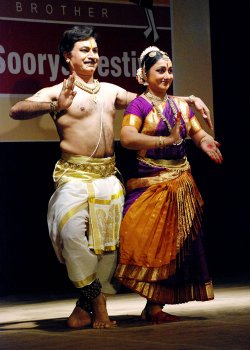 |
 |
Visual treat
by the Shridhars
October 13, 2009  Bangalore
based Shridhar and Anuradha are made for each other as a dancing couple.
Their performance recently under the aegis of Thalam in Thrissur proved
to be a visual treat. Bangalore
based Shridhar and Anuradha are made for each other as a dancing couple.
Their performance recently under the aegis of Thalam in Thrissur proved
to be a visual treat.
The Bharatanatyam recital began with an invocatory item Nritanjali followed by Siva Sthuthi, in Poorvakalyani ragam, adi thalam. As the dance progressed, enacting stories from Siva Purana, the duet epitomized the spirit of Panchakshari. The Varnam was a composition of Muthiah Bhagavathar in ragam Kamboji and adi thalam. The choreography has incorporated elements from yoga and tantra. The story of Meenakshi and Sundareswara at one level has a human dimension that has the halo of iconography associated with the temple of Madurai Meenakshi. At a deeper level the surging of kundalini from Mooladhara chakra to chandramandala where prakriti and purusha coalesce, is a glorious interpretation. And the piece concludes with the concept of Ardhanariswara embedded in Sreechakra as triangle upon triangle. That the female principle asleep within the male surges up to unreachable heights only for creation, that creation is divine, that the story of human achievement in art and culture is the sum total of this principle, is the concept underlying the theme. It is a classic piece superlative in dimension, brilliant in composition, aesthetically satisfying in performance. The solo by Anuradha was from Devarnama composed by Vadiraja in Kalyani ragam, Khandachapu thalam, which highlights the love of Yashoda for Krishna. Vatsalya as the sole rasa, comes alive in the noblest and most glorious of all human relations, that of the mother-child where blood cannot lay any claim. The graceful performance by Anuradha touches the chords of your heart to sing a certain lullaby or you hear the intimations of your own infancy buried deep within. Shridhar is a thinker delving into ancient Indian literature for inspiration, archetypes, and models. His choreography is rooted in classical poise. Although a classicist to the core, Shridhar is imbued with modern sensibilities, for the solo piece sends a message to ponder our conscience. The solo brings Dhritharashtra, the loser, into focus. When all the hurly burly of war is over, when the irreparable loss strikes home, the blind king staggers under the load of his own action, or rather inaction. His confession to Sanjaya, his alter ego, is the theme. His realization of how much he has been deluded by his affection for his son, how his failure to act in time has been the root cause of his tragedy, and a nation's tragedy, is a message indeed.
Yes, even here, there is a milestone, a glorious moment when the blind king attains sight. When his sons gather to capture Krishna, to tie down the messenger of peace, Krishna rises in stature: Viswaroopa darsanam was the only sight he had seen in all his life. And he knew what was in store for... The war was another saga of crime and punishment: from the killing of the boy Abhimanyu to the killing of Duryodhana. The result... colossal waste! "Yes, I had known all along...," the tragic fall of a king after such a folly was a heart rending presentation. Slokas from Vyasa Bharatha in Ragamalika, adi thalam heightened the dramatic and the poetic. The haunting refrain highlighting the tragic vision he ignored highlights the human dilemma. And it poses the question as if it were an eternal one for political India when leaders ignore the warning signals. The last item
was a Thillana in ragam Chenjurutti and thalam adi. In a rare chemistry
with a touch of alchemy from the team of orchestra, the piece was a fitting
conclusion. Vocalist Bharati Venugopal was ably supported by Kartik Dutta
on nattuvangam. Mridangam by vidwan Chandrashekharan created a rhythmic
magic enlivened by flute by Vidwan Narasimham. And the dancing couple unconsciously
projected how harmony lies in love, the eternal values, told and retold
since Siva and Parvathi through innumerable artistes in India, down the
millennia, by artistes like them, dancing couples made for each other.
Padma Jayaraj is a freelance writer and a regular contributor to www.narthaki.com |